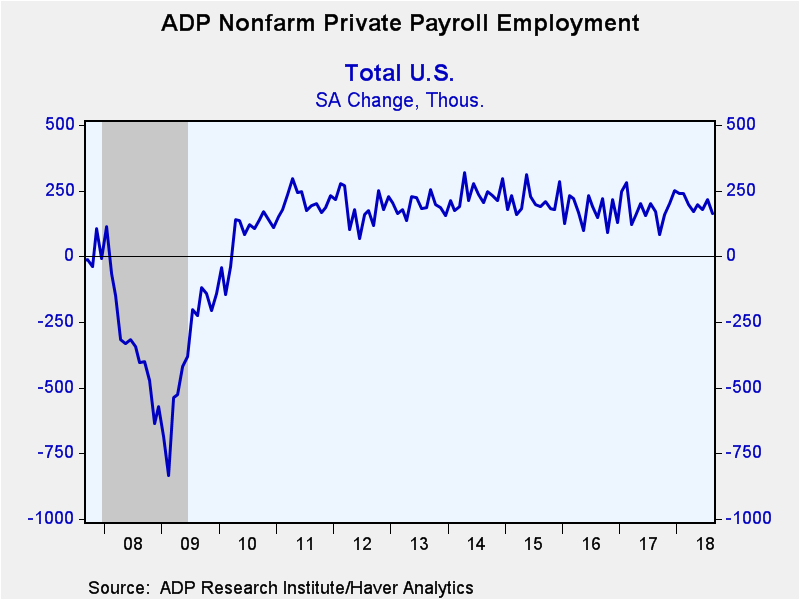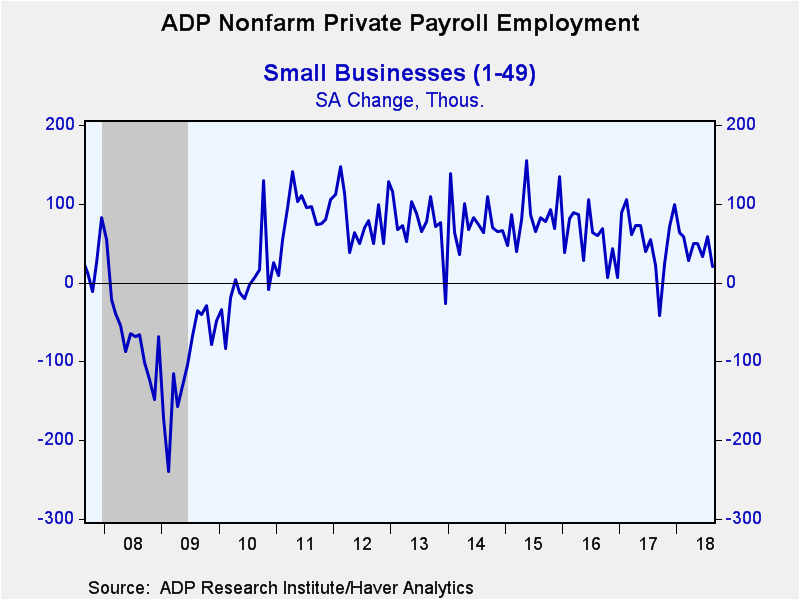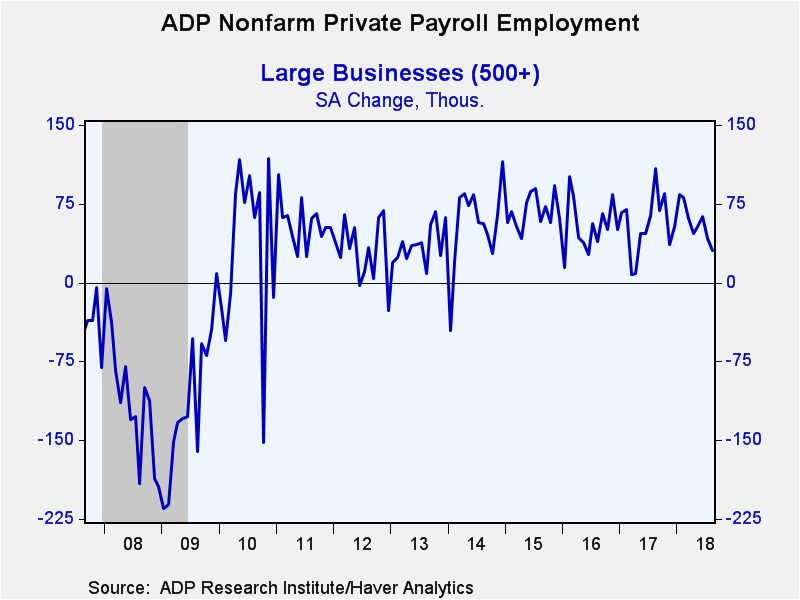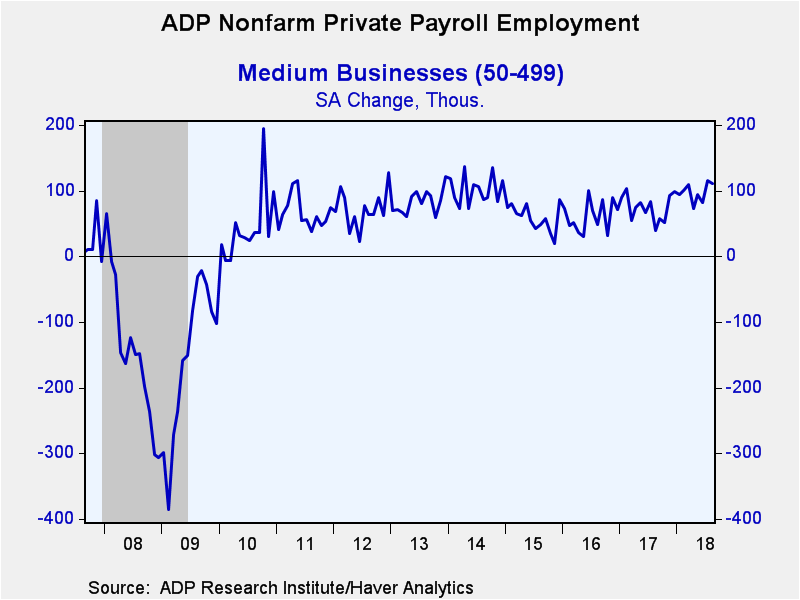 Global| Sep 06 2018
Global| Sep 06 2018U.S. ADP Private Payroll Increase Moderates
by:Tom Moeller
|in:Economy in Brief
Summary
The ADP/Moody's National Employment Report indicated that private nonfarm payrolls increased 163,000 during August (1.8% y/y) following a 217,000 July gain, revised from 219,000. The increase disappointed expectations for a 190,000 [...]
The ADP/Moody's National Employment Report indicated that private nonfarm payrolls increased 163,000 during August (1.8% y/y) following a 217,000 July gain, revised from 219,000. The increase disappointed expectations for a 190,000 rise expected in the Action Economics Forecast Survey. It was the smallest increase since October. It pulled the three-month moving average change to 186,000, down from 227,000 averaged in Q1. During the last ten years, there has been a 96% correlation between the change in the ADP figure and the change in nonfarm private-sector payrolls as measured by the Bureau of Labor Statistics.
The Automatic Data Processing Research Institute survey is based on ADP's business payroll transaction system covering 411,000 companies and nearly 24 million employees. The data are processed by Moody's Analytics Inc., then calibrated and aligned with the BLS establishment survey data. The ADP data cover private sector employment only.
Small-sized payrolls expanded 21,000 (1.0% y/y) after a 59,000 July gain. Three-month average growth has decelerated from the recent high of 85,000 in Q1'17. Large-sized payrolls improved 31,000 (2.5% y/y) following a 42,000 rise. Three-month average growth deteriorated to 45,000, roughly half the growth as of October. Medium-sized payrolls increased 111,000 (2.4% y/y). Three-month average growth picked up to 103,000, the strongest in roughly four years.
Private service-producing payrolls increased 139,000 (1.7% y/y), the weakest gain in four months. Education & health services employment rose a lessened 31,000 (2.0% y/y) while professional & business services jobs rose a weakened 38,000 (2.6% y/y). Employment in the leisure & hospitality sector increased a moderated 25,000 (2.1% y/y). The number of trade, transportation and utilities jobs firmed a steady 21,000 (1.1% y/y). Financial activities jobs increased a lessened 7,000 (1.4% y/y). Employment in the information sector rose an improved 8,000 (-0.1% y/y).
Employment in the goods-producing sector rose 24,000 (2.4% y/y), the smallest increase since October. Job growth in the factory sector remained strong, posting a 19,000 rise (1.8% y/y). Growth in construction employment weakened to 5,000 (3.0% y/y) from a 35,000 December high. Jobs in the natural resource & mining sector fell 1,000 (+6.2% y/y).
The ADP National Employment Report data can be found in Haver's USECON database; historical figures date back to April 2001 for the total and industry breakdown, and back to January 2005 for the business size breakout. The expectation figure is available in Haver's AS1REPNA database
| ADP/Moody's National Employment Report | Aug | Jul | Jun | Aug Y/Y | 2017 | 2016 | 2015 |
|---|---|---|---|---|---|---|---|
| Nonfarm Private Payroll Employment (m/m chg, 000s) | 163 | 217 | 178 | 1.8% | 1.8% | 1.9% | 2.3% |
| Small Payroll (1-49) | 21 | 59 | 33 | 1.0 | 1.3 | 1.9 | 1.9 |
| Medium Payroll (50-499) | 111 | 116 | 82 | 2.4 | 1.9 | 1.5 | 2.3 |
| Large Payroll (>500) | 31 | 42 | 63 | 2.5 | 2.3 | 2.7 | 3.0 |
| Goods-Producing | 24 | 41 | 27 | 2.4 | 1.5 | 0.8 | 2.0 |
| Construction | 5 | 16 | 10 | 3.0 | 3.1 | 4.3 | 5.3 |
| Manufacturing | 19 | 22 | 13 | 1.8 | 0.7 | 0.2 | 1.2 |
| Service-Producing | 139 | 177 | 151 | 1.7 | 1.8 | 2.2 | 2.3 |
Tom Moeller
AuthorMore in Author Profile »Prior to joining Haver Analytics in 2000, Mr. Moeller worked as the Economist at Chancellor Capital Management from 1985 to 1999. There, he developed comprehensive economic forecasts and interpreted economic data for equity and fixed income portfolio managers. Also at Chancellor, Mr. Moeller worked as an equity analyst and was responsible for researching and rating companies in the economically sensitive automobile and housing industries for investment in Chancellor’s equity portfolio. Prior to joining Chancellor, Mr. Moeller was an Economist at Citibank from 1979 to 1984. He also analyzed pricing behavior in the metals industry for the Council on Wage and Price Stability in Washington, D.C. In 1999, Mr. Moeller received the award for most accurate forecast from the Forecasters' Club of New York. From 1990 to 1992 he was President of the New York Association for Business Economists. Mr. Moeller earned an M.B.A. in Finance from Fordham University, where he graduated in 1987. He holds a Bachelor of Arts in Economics from George Washington University.
More Economy in Brief
 Global| Feb 05 2026
Global| Feb 05 2026Charts of the Week: Balanced Policy, Resilient Data and AI Narratives
by:Andrew Cates










